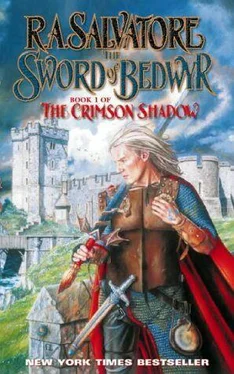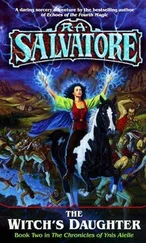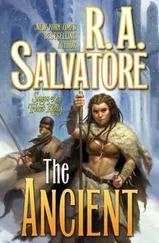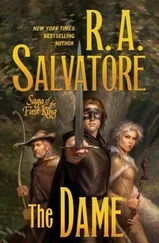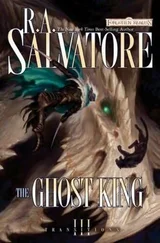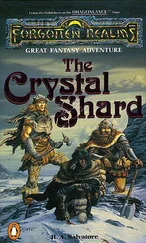Luthien didn’t have to go up through the inner wall to imagine the types of people he would meet within its confines. Grand houses peeked over the wall, some with spires soaring up into the sky. He thought of Aubrey and Avonese, and suddenly he had no desire to go up into the higher section at all. What he did notice, though, and it touched him as more than a little curious, was that more guards walked the inner wall than both of the outer walls combined.
The young Bedwyr didn’t understand it at that time, but what he was getting was his second taste of a society sharply divided by its economic classes.
Oliver led the way into the shadow of a cliff, Montfort’s southeastern section, and to a stable. He knew the hands well there, it seemed to Luthien, and tossed the stablemaster an ample pouch of coins. With no bartering and no exchange of instructions, just a friendly greeting and small conversation, Oliver handed over Threadbare’s reins and bade Luthien do the same with Riverdancer. Luthien knew how much Oliver cared for his exceptional, if ugly, pony, and so he held no reservations. Oliver had obviously boarded the pony here before to his complete satisfaction.
“On to the Dwelf,” the halfling announced when they departed, Luthien carrying the saddlebags over one shoulder.
“The Dwelf?”
Oliver didn’t bother to explain. He led on to a seedier section of town, where the eyes of the waifs in the streets showed a hard edge, and where every door seemed to belong to a tavern, a pawn shop, or a brothel. When Oliver turned toward one of these doors, Luthien understood it to be their destination, and in looking at the sign over the place, he understood the name Oliver had given to it. The painting on the sign depicted a sturdy, muscular dwarf and a Fairborn elf, leaning back to butt, each smiling widely and hoisting drinks—a mug of ale for the dwarf and a goblet, probably of wine, for the elf. “THE DWELF, FINE DRINK AND TALK FOR DWARF AND ELF,” the words proclaimed, and underneath them someone had scribbled, “Cyclopians enter at your own risk!”
“Why the Dwelf?” Luthien asked, stopping Oliver short of the door.
Oliver nodded down the street. “What do you see at the other taverns?” he asked.
Luthien didn’t understand the point of the question. All the places seemed equally busy. He was about to respond when he realized Oliver’s intent: all the patrons at the doors to the other bars were either human or cyclopian.
“But you are neither dwarf nor elf,” Luthien reasoned. “Nor am I.”
“The Dwelf caters to men as well and, mostly, to all who are not men,” Oliver explained.
Again, Luthien had a hard time comprehending that point. While there were few Fairborn and even fewer dwarves on Bedwydrin, they were in no way segregated from the general community. A tavern was a tavern, period.
But Oliver seemed determined, and the halfling certainly knew his way around Montfort better than Luthien, so the young Bedwyr offered no further protests and willingly followed Oliver into the tavern.
He nearly choked as he entered, overwhelmed by a variety of smells, ale and wine and exotic weeds the most prominent among them. Smoke hung thick in the air, making the crowd seem even more ominous to Luthien. He and Oliver picked their way through clusters of tables, most surrounded by groups of huddled men, or huddled dwarves, or huddled elves—there didn’t seem to be much mingling between the races. Five cyclopians, silver-and-black uniforms showing them to be Praetorian Guards, sat at one table, laughing loudly and casually tossing out insults to anyone near to them, openly daring someone to make trouble.
All in all, it seemed to Luthien as if the whole place was on the verge of an explosion. He was glad he had his sword with him, and he clutched the saddlebags protectively as he bumped and squeezed his way to the main bar.
Luthien began to better appreciate the allure of this place to some of the nonhumans when he saw that many of the bar stools were higher than normal, with steps leading up to them. Oliver perched himself comfortably on one, easily able to rest his elbows on the polished bar.
“So they have not yet hung you, eh, Tasman,” the halfling remarked. The barkeep, a rough-looking, though slender character, turned around and shook his head as he looked upon Oliver, who returned the look with a huge smile and a tip of his great hat.
“Oliver deBurrows,” Tasman said, moving over and wiping the bar in front of the halfling. “Back in Montfort so soon? I had thought your previous antics would have kept you away through the winter at least.”
“You are forgetting my obvious charms,” the halfling replied, none too worriedly.
“And you’re forgetting the many enemies you left behind,” Tasman retorted. He reached under the bar and produced a bottle of dark liquor and Oliver nodded. “Let’s hope that they’ve also forgotten you,” the barkeep said, pouring Oliver a drink.
“If not, then pity them,” Oliver replied, lifting his glass as though the words were a toast. “For they will surely feel the sting of my rapier blade!”
Tasman didn’t seem to take well to the halfling’s cavalier attitude. He shook his head again and stood a glass in front of Luthien, who had retrieved a normal-sized stool to put next to Oliver’s.
Luthien put his hand over the mouth of the glass before Tasman could begin to pour. “Just some water, if you please,” the young man said politely.
Tasman’s steel gray eyes widened. “Water?” he echoed, and Luthien flushed.
“That is what they call light ale on Bedwydrin,” Oliver lied, saving his friend some embarrassment.
“Ah,” Tasman agreed, though he didn’t seem to believe a word of it. He replaced the glass with a flagon topped by the foam of strong ale. Luthien eyed it, and eyed Oliver, and thought the better of protesting.
“I . . . we, will be in need of a room,” Oliver said. “Have you any?”
“Your own,” Tasman replied sourly.
Oliver smiled widely—he had liked his old place. He reached into a pocket and counted out the appropriate amount of silver coins, then started to hand them over.
“Though I suspect it will need a bit of cleaning up,” Tasman added, reaching for the coins, which Oliver promptly retracted.
“The price is the same,” Tasman assured him sharply.
“But the work—” Oliver began to protest.
“Is needed because of your own antics!” Tasman finished.
Oliver considered the words for a moment, then nodded as though he really couldn’t argue the logic. With a shrug, he extended his arm once more and Tasman reached for the payment.
“Throw in a very fine drink for me and my friend,” Oliver said, not letting go.
“Done, and you’re drinking them,” Tasman agreed. He took the money and moved off to the side.
When Oliver looked back to Luthien, he found the young man eyeing him suspiciously. The halfling let out a profound sigh.
“I was here before,” he explained.
“I figured that much,” Luthien replied.
Oliver sighed deeply again. “I came here in the late spring on a boat from Gascony,” Oliver began. He went on to tell of a “misunderstanding” with some of the locals and explained that he had gone north just a few weeks before in search of honest work. All the while, Tasman stood off to the side, wiping glasses and smirking as he listened to the halfling, but Luthien, who had seen firsthand the reason Oliver, the highwayhalfling, had gone north, didn’t need Tasman’s doubting expression to tell him that Oliver was omitting some very important details and filling in the holes with products of his own imagination.
Luthien didn’t mind much, though, for he could guess most of the truth—mainly that Oliver had probably been run out of town by some very angry merchants and had willingly gone north following the caravans. As he came to know the halfling, the mystery of Oliver deBurrows was fast diminishing, and he was confident that he would soon be able to piece together a very accurate account of Oliver’s last passage through Montfort. No need to press the issue now.
Читать дальше
